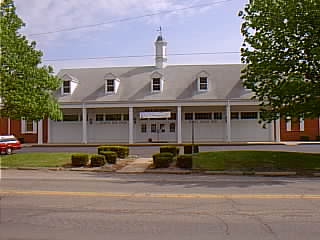 When asked why they chose their
field, Knox County's holistic practitioners gave a number of reasons. For some, a holistic outlook has always been
part of their way of life or their system of beliefs. The techniques they practice may
have been handed down through family. John Wells, a reflexologist, "grew up doing alternative therapies, having
grown up in Appalachia, and not having a lot of means to get a lot of medical treatments some times." For
others, first exposure to holistic health practices happened later in life. A local practitioner in therapeutic
touch described reading an article on the subject after years of working in an allopathic medical field, and being
extremely intrigued. For this practitioner, more information about therapeutic touch led to more interest, and
then to taking classes. A number of practitioners also mentioned dissatisfaction with conventional medicine as
a reason for pursuing an interest in a holistic way of life.
When asked why they chose their
field, Knox County's holistic practitioners gave a number of reasons. For some, a holistic outlook has always been
part of their way of life or their system of beliefs. The techniques they practice may
have been handed down through family. John Wells, a reflexologist, "grew up doing alternative therapies, having
grown up in Appalachia, and not having a lot of means to get a lot of medical treatments some times." For
others, first exposure to holistic health practices happened later in life. A local practitioner in therapeutic
touch described reading an article on the subject after years of working in an allopathic medical field, and being
extremely intrigued. For this practitioner, more information about therapeutic touch led to more interest, and
then to taking classes. A number of practitioners also mentioned dissatisfaction with conventional medicine as
a reason for pursuing an interest in a holistic way of life.Several holistic practitioners mentioned taking class as their training process. These classes range in types, from weekend seminars to year-long programs. Massage therapy, in particular, is a profession which is licensed by the state of Ohio. Massage therapists receive a degree, and then must take a standard licensing exam to practice. Reflexology and reiki also have established training and certification processes. Most other healing techniques, however, are learned in informal settings.
From discussions during the interviews, it is clear that there is little that is "standard" about a treatment session with a holistic practitioner. From all accounts, the length and techniques of a session are dependent on the needs and attitude of the patient.
What all holistic health care providers interviewed seemed to share was a sense of the need for the involvement of the body, mind, and spirit in healing. All placed the responsibility for healing on the patient. This was said again and again in a number of ways:
"All I am is a facilitator. I can give the body a jump start, but for the most part it's up to you."
"I say, ‘What are we gonna work on?' Because this is your body."
"Let's have you help you."
"It's best to get to the root of things. If not, you're just treating symptoms."
"I don't treat symptoms anymore, I treat the whole person."
All of the above quotes place the responsibility of health onto the patient. A holistic approach, then, focuses more on living a healthy lifestyle to maintain health, and less on treating a problem to regain health. This was also reflected in the various answers given by practitioners to the question, "How many visits to you does it take to treat a particular problem?" While all mentioned this as based on the individual, a few also stated that they do not like to schedule a series of sessions. Instead, they would prefer that patients think about their own healing process and visit the practitioner only if they feel it helps, and only as they feel they need it. The goal in holistic health is overall change, and the practitioners generally seem to view themselves as only one part in this process.
There was some discussion throughout interviews about whether to classify chiropractors as holistic healers or as part of conventional biomedicine. Those interviewed gave different opinions of the subject. Chiropractors are often the primary health care practitioners of residents of Knox County. They are said to have much respect in the community. Chiropractors have been given staff privileges at Knox Community Hospital. Overall, it seemed that the opinion of holistic practitioners on chiropractors varied with the techniques employed in the chiropractic practice. Some saw chiropractors as only "little doctors," and thus not holistic at all. Others said that the chiropractic manipulation techniques as valuable tools for a holistic type of health care.
